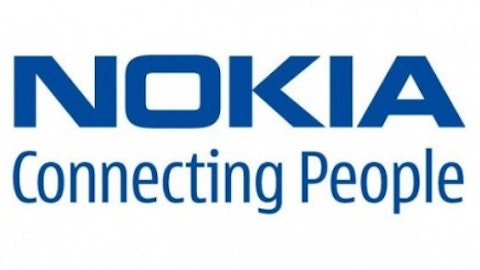
The shares are knocking on the door of $1,000. The market cap takes an increasingly large bite out of the total NASDAQ, and is now at nearly $290 billion. (By contrast International Business Machines Corp. (NYSE:IBM) is worth less than $230 billion.) Perhaps most dangerous, investors are now paying $26 for each $1 in Google Inc (NASDAQ:GOOG) earnings, and nearly $6 for each $1 of Google Inc (NASDAQ:GOOG) sales, to own the stock.
I own some Google stock. I bought it at around $500. I sold half my position at $812 a few months ago, but retain a small stake that has increased in value. For now, I’m holding tight, knowing even a precipitous fall won’t mean a loss.
Your mileage, of course, varies. So let’s look at the bearish case and see how it holds up.
The government closes in
Two things happened that caused Apple Inc. (NASDAQ:AAPL) to fall from the tree.
One is that the government started looking more closely at the company’s operations. And not just our government, governments around the world.
This is starting to happen to Google. Having managed to face down twin US and EU inquiries into its search function with minimal damage, the company is now facing a new inquiry into how it handles display advertising.
Each inquiry is a pinprick but eventually it adds up. The EU is also looking into how Google Inc (NASDAQ:GOOG)’s Motorola unit handles its patents. Canada is launching a search inquiry. Argentina and South Korea are on deck.
All these inquiries take time to deal with, and settlements add layers of bureaucracy to Google’s existing operations, slowing its ability to move.
Google Inc (NASDAQ:GOOG) has always had enemies seeking government’s aid against it. The Bell companies have been trying to get the government after Google for years. But the opposition is becoming increasingly politicized. The Koch-funded Heartland Institute recently gave Bell-centric Google-basher Scott Cleland a place on its Web site. This could spell trouble if Republicans take back the White House, and it dramatically increases risks when the company goes to Congress. (Don’t expect the kind of backrub they recently gave Apple Inc. (NASDAQ:AAPL) CEO Tim Cook.)
Speaking of which, Google Inc (NASDAQ:GOOG) also finds itself in the same tax avoidance dock as Apple Inc. (NASDAQ:AAPL) does. The difference is that Google’s problems are hardest in Europe, where no American executive should expect a backrub. As with other American companies, Google moves money earned in high-tax jurisdictions to Ireland, then on to Bermuda, and the continuing Europe-wide campaign against tax havens could yet ensnare shareholders in losses.
The law of numbers
The other danger is simply the law of large numbers. As numbers get serious, they get tougher to raise.
Here the news is potentially good. Google Inc (NASDAQ:GOOG) is currently less than one-third Apple’s size, by revenue. It reported $14 billion in revenue during the first quarter, against Apple’s $43 billion.
But Google’s revenues are service revenues. They’re earned a fraction of a penny at a time, as people click on Google ads, and use Google services. Apple Inc. (NASDAQ:AAPL) gets hundreds of dollars with each handset sale.
Is Google Inc (NASDAQ:GOOG) reaching its revenue ceiling? The company is said to be sniffing around Waze, a service for getting around traffic, in order to add that to Google Maps. The price would be over $1 billion. But would it be accretive to Google’s earnings? Most likely, the technology would be added to Google Maps. Would that dramatically increase the use of Maps? Google already dominates in this space – it’s hard to see how.


